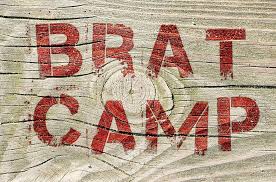The use of the term “teen boot camp” is still being debated. The media tend to focus on the “in your face” element of teen boot camps — the element that professionals who work with teens like the least.
Dr. MacKenzie, who has been studying adult boot camps since 1987, holds that defining the term “boot camp” has been a major issue and remains one. Her 1991 survey of adult boot camps (MacKenzie and Souryal, 1991) found some common boot camp characteristics, including:
1. A military-style environment.
2. Separation of boot camp participants from regular prison inmates when they are housed in collocated facilities.
3. The participants’ perception that boot camp is an alternative to a longer term of confinement.
4. Some hard labor.
The most noteworthy finding from Dr. MacKenzie’s survey, however, was that boot camp programs differ widely, particularly with regard to the amount of time participants spend in therapeutic activity and in the aftercare they are provided.
The definition of teen boot camps given by OJP in its Fiscal Year 1995 Corrections Boot Camp Initiative: Violent Offender Incarceration Grant Program includes the following elements:
1. Participation by nonviolent offenders only (to free up space in traditional facilities for violent felony offenders, i.e., those who have used dangerous weapons against another person, caused death or serious bodily injury, or committed serious sex offenses).
2. A residential stay of 6 months or less.
3. A structured schedule stressing discipline, physical training, and work.
4. Participation by juveniles in appropriate education opportunities, job training, and substance abuse counseling or treatment.
5. Provision of aftercare services that are coordinated with the program that is provided during the period of confinement.
In the 90s the military-style boot camps became popular. Several daytime talk shows like Dr. Phil showed uniformed men yelling at and intimidating teens and adolescents into behaving in the way they wanted them to. The problem with this type of boot camp is that the teen was learning to behave in a particular fashion when in a controlling and intimidating environment. They were not learning how to make good decisions in the environment they would return to upon leaving the camp. Because the scope of this type of boot camp was so limited, long-term change in the participants was often very limited. Coercing a teen to behave through fear and intimidation is not likely to change any core beliefs or teach them any life skills that will help them in the daily challenges they will face outside of the program.
Too many parents think that a boot camp will be a quick fix for negative behavior patterns that have developed over months or even years. Unless, or until, the juvenile learns to cope with and make consistent good choices in their regular environment, lasting changes are not likely to occur. Most of these behaviors have developed overtime as a method of adapting to and coping with life. Adolescence is, arguably, one of the most difficult times in a person’s life. Along with new types of responsibility and freedom comes many choices about behavior, friends, priorities, values, and how one will spend his/her free time. Most teens start looking to peers or role-models outside of their home and can be greatly influenced by these people. If a teen starts to identify with the “wrong crowd” and finds the belonging they are seeking they will likely follow the actions and behaviors of that crowd, even if it doesn’t coincide with the values and lifestyle they were raised with.
For parents that feel like their teen is out of control and don’t know where to turn for help, boot camp is one option; but remember that until the underlying concerns and issues the teen is dealing with are addressed, long-term change is unlikely. A good place to start is by simply talking to your teen. Try to understand the emotions and fears that are driving the undesired behavior and ask them if they are ready to make a change. Often the teen wants out but doesn’t know how to make the change. If they know they have the help, love, and support of a parent or trusted individual they can make radical change, without a boot camp or other program. If your teen does open up to you, be sure and follow through with the support they need. This may require changing schools, spending more time talking and listening to your teen to help them learn basic choice and accountability and decision making skills that will help him/her achieve desired results. Bad behavior is most often a cry for attention, providing adequate time and attention may be all that is needed. Consult with a therapist for professional counsel on what is the best option for the troubled teen in your life.



